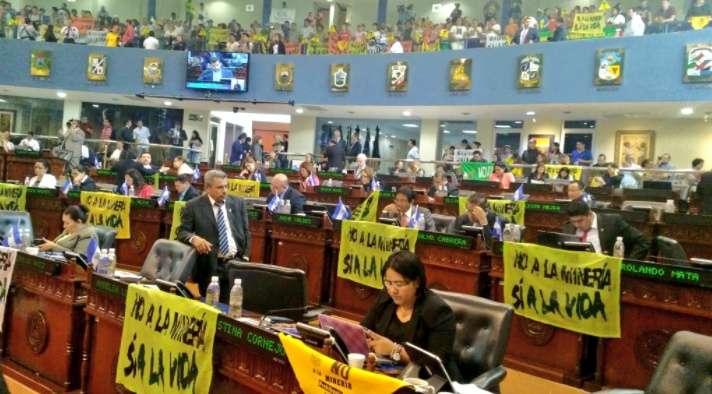
We dreamed of the day when we could share this news.
Last week, the government of El Salvador voted to ban outright all metal mining in the country. The decision makes the small Central American country the first to halt a modern day gold rush, effectively stopping all mining projects in the pipeline.
When the National Roundtable Against Metallic Mining first proposed this legislation almost ten years ago, many thought the idea was preposterous, unwinnable, and a non-starter.
But the Salvadoran social movement never wavered in its resolve. Years of organizing, educating, and mobilizing – led by courageous activists on the frontlines in the northern province of Cabañas, led to the vote which declared unequivocally that water is worth more than gold and that life is more valuable that corporate profits.
The final vote tally mirrored the results of a national consultation process in which more than 70% of Salvadorans voted against mining in their territories.
In El Salvador, a water-parched country with 96% of its surface water already contaminated, communities heard from affected groups in neighboring Guatemala and Honduras about the devastating impacts of mining. These stories added to El Salvador’s own experience with gold mining companies.
In the mid 2000’s, Commerce Group failed to mitigate contamination from its San Sebastian mine into a local river, which now has eleven times the healthy limit for cyanide and one thousand times the limit for lead. In the case of Pacific Rim Mining (now OceanaGold), El Salvador defended itself for seven years against a $250 million lawsuit after it denied the company an extraction license for environmental reasons.
For all of us at CIEL, it is a great honor and privilege to have played a small part in supporting the National Roundtable and its network of allies in this struggle for nearly a decade. Their win is a win for us all.
Their perseverance against enormous odds is an inspiration for our movement.
As Cristina Starr from Radio Victoria said: “Today water won over gold.”
Read more: New York Times; Guardian; BBC (español); MiningWatch Canada
Originally posted April 7, 2017
